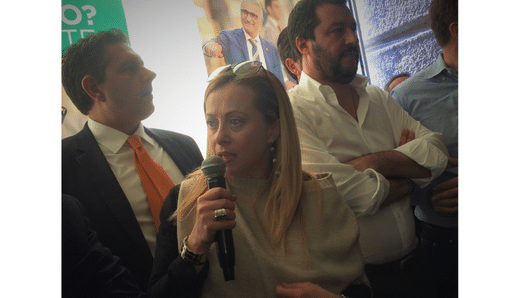Meloni (FdI) and Salvini (Lega) in 2017 (WikiMedia Commons)
In Italy, Giorgia Meloni's radical-right, post-fascist Fratelli d'Italia (FdI) party has won the parliamentary elections with 26% of the votes. Meloni is thus well on her way to becoming Italy's first female prime minister. Going forward, she will attempt to form a coalition with allies on the far right flank - Matteo Salvini's "Lega" and Silvio Berlusconi's "Forza Italia". The result fits seamlessly into the erratic Italian pattern during elections in recent decades, where different populist parties tussle for political power. At the same time, European observers are watching Rome and the possible destabilisation of the EU by Meloni's rapid rise with great concern.
Results
In the Italian electoral system, two-thirds of seats are distributed through a proportional system, and one-third through a majority system. This complex method ensures that Meloni's FdI (26.0% of votes) has a majority with Lega (8.8%) and Forza Italia (8.1%). With a total of 42%, they could form a radical-right government - the most right-wing since fascist Italy under Benito Mussolini. The centre-left Partito Democratico (PD) achieved a historically poor result with 19.1%, while the populist Five Star Movement (15.4%) did better than expected. Election turnout was only 63.9 per cent, 9 percentage points lower than in 2018. This shows Italians' low confidence in politics - but bad weather in southern Italy and the one- rather than three-day voting session might also have played a role.
What to expect from Meloni?
Meloni's party FdI has fascist roots; she herself praised Mussolini at 19 as a "good politician". In the run-up to the elections, FdI has diligently tried to shake off this image, presenting itself as a more mainstream right-wing party. However, the FdI remains very reactionary with tough positions against abortion, LGBT+ rights and migration. On many of these issues, Italy is already one of the most conservative countries in Europe.
In Trumpian fashion, Meloni fulminates about 'those' who threaten Italy's core values. The EU also has to take the rap in this - for Meloni, it's 'Italy first'. Whether this will lead to Hungarian scenes remains to be seen, as Meloni repeatedly stated that cooperation within the EU is important. She also condemned the Russian invasion of Ukraine and is outspoken in favour of arms supplies to Ukraine.
However, on Italy's far-right flank, the Kremlin is never far away. Meloni's ally Salvini (Lega) signed a memorandum of cooperation with Putin's party as recently as 2017, and Forza Italia's Berlusconi said in the week before the elections that "Putin wanted to replace the Zelensky government with good people". Even Meloni, in 2021, in her book "I am Georgia", indicated as recently as 2021 that Putin's Russia was "defending European values and Christian identity".
The conjuncture of populism
Meloni's rise fits the pattern of post-1994 Italian politics. Prior to that, the post-fascist political system was completely dominated by Democrazia Cristiana (DC) which kept the Italian Communist Party (PCI) from political power at the time of the Cold War. A huge corruption scandal ("Tangentopoli") in 1992 caused the collapse of almost all established political parties and a meteoric rise of anti-system and anti-establishment parties. In 1994, Forza Italia, built around the personality cult of media tycoon Silvio Berlusconi, seized political power five months after the party was founded. Tax fraud, scandals, and a dramatic economic situation cost Berlusconi his head after three cabinets in 2011.
After this, the populist Five Star Movement (M5S) very quickly found its way to power - agenda-setting large-scale economic support programmes. Internal party problems and unfulfilled promises brought Italian voters to a new saviour: but Matteo Salvini's Lega was also unable to deliver on many promises after successful elections in 2018. In 2022, therefore, disillusioned Italian voters will once again reckon with Rome's political leaders. The only party that did not participate in the coalition of national unity under Mario Draghi (2021-2022) was Fratelli d'Italia. This is therefore seen by many observers as a major explanation for its meteoric rise and huge victory.
What now for Italy and the EU?
This "conjuncture of populism" is no stranger to other countries in the EU. In particular, the 2009 economic crisis played an important role in the rise and popularity of populist anti-system parties. Now that the Russian invasion of Ukraine has caused an unprecedented energy crisis in Europe, Brussels needs to reckon with this scenario.
Italy is in a very dire economic situation. The European Commission supports Italy with a large-scale aid programme, linked to important guarantees about the Union's core values. In the case of Hungary, the EU has already finally shown that it dares to withdraw funds in case of large-scale violations of core values.
While core democratic values within the EU should be beyond question, it is important for the EU to take a stimulating role with regard to the Italian economy and working class. A large part of Italians have come to see the EU as a head of blame for all the country's problems, propelled by the "them-against-us" thinking of populist opportunists. In the face of a possible Italian debt crisis, punitive, harsh measures - as in Greece in 2014 - are undesirable. This upsets many voters and is grist for even more populism and anti-EU sentiment. As Brussels has already shown with the energy price cap or the fight for a fair minimum wage, the bloc can also play an important role as protector of Europe's working class. This could be a good start, in countries like Italy, to turning fears of populism into opportunities for social, fair, and democratic politics.
Sources: Brookings Institution BBC The Guardian Washington Post
Photo: WikiMedia Commons




